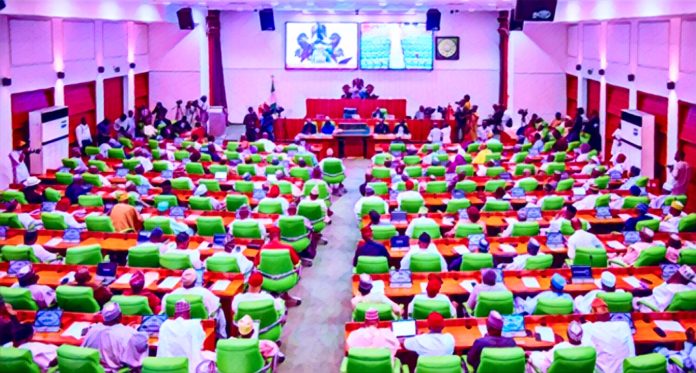-
Lawmakers used the focus keyphrase to demand action on unpaid debts.
-
The focus keyphrase highlighted a motion pushing the executive to pay by a deadline.
-
The focus keyphrase triggered a one-week break in plenary to apply pressure.
In support of unpaid contractors who have protested at the National Assembly, the House of Representatives took a week off from work.
Members of the House agreed to stop all business and start again next Tuesday after things got heated because the government was still delaying releasing money for completed projects.
The Coalition of Federal Contractors of Nigeria led the protest, which made it hard to get to the National Assembly complex in Abuja. Contractors yelled slogans and demanded that they be paid right away for work done in the 2024 and 2025 budget years. The Nigeria Police Force and the Department of State Services sent security officers to keep the peace.
Lawmakers cite neglect and hardship caused by unpaid debts
Kingsley Chinda (PDP–Rivers), the Minority Leader, put forward a motion of urgent national importance during the plenary on Tuesday. He said that unpaid debts had put a lot of small and medium-sized businesses that rely on government contracts out of business. Chinda said that the executive was guilty of “systemic neglect” because ministries have not paid up even though they have verified completion certificates.
Aliyu Madaki (NNPP–Kano) and Kabiru Maipalace (APC–Zamfara) both supported the motion, which got support from both parties. Maipalace suggested that the House take a week off as a show of support and to give the executive time to act. He said that if Parliament kept doing business while contractors were left in the dark, it would be “complicit in silence.”
Reps issue seven-day ultimatum to ministers over delayed project payments
The resolution also gave the Minister of Finance, Wale Edun, and the Minister of Budget and Economic Planning, Atiku Bagudu, seven days to come to an agreement and pay all verified contractor bills. Oluwatoyin Madein, the Accountant General of the Federation, was told to make sure that the money is sent out quickly after the accounts are settled.
Francis Waive, the chairman of the House Committee on Rules and Business, seconded the motion, saying that the contractors’ blockade had made it hard to get into the chamber. He said that the break was needed to ease tensions and give government agencies time to meet the House’s request.
In the absence of Speaker Tajudeen Abbas, Deputy Speaker Benjamin Kalu oversaw the motion, which got unanimous support. Kalu called the adjournment “an act of empathy and accountability” and told the executive to make the issue a national priority.
Later, representatives from the contractors thanked the lawmakers, saying that their decision gave them new hope that their problems were being heard. Samuel Olayinka, a contractor, said that many of them had borrowed a lot of money to finish government projects and were now going bankrupt.
According to government sources in the Ministry of Finance, the delays in payments were caused by audits that were still going on and revenue projections that were too low. The House resolution, on the other hand, has put more pressure on the executive branch to make at least some payments before the start of the new legislative week.
As lawmakers get ready to meet again, the focus is now on whether the Finance and Budget Ministries will meet the seven-day deadline. If they don’t, there could be more fighting when plenary meets again next Tuesday.



